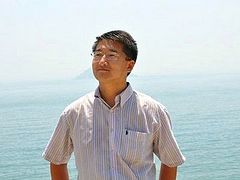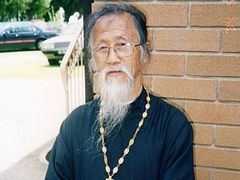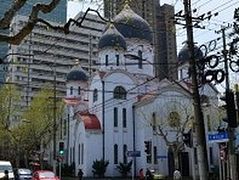Source: The China Post
May 2, 2016

His red and gold vestments bathed in candlelight, the first mainland Chinese Orthodox priest ordained for six decades led an Easter service on Sunday — one of the most surprising fruits of warming ties between Moscow and Beijing.
Alexander Yu Shi said prayers in the Church Slavonic language and in Mandarin beside the Church of Holy Protection in the northeastern city of Harbin, surrounded by local worshippers.
"It is a happy day. We are welcoming the resurrection," he said. "And for the Eastern Orthodox Church in Harbin, it's also a resurrection."
The small and elderly Orthodox community — mostly descended from Chinese and Russians who intermarried in the city's cosmopolitan heyday a century ago — lacked a priest for 15 years.
Yu, a soft-spoken former bank manager, is the first ever Chinese to have studied at an Orthodox seminary with backing from China's avowedly atheist Communist Party.
"With the help of the governments of both countries, I was able to learn theology systematically," he told AFP in his office, sitting below photographs of himself alongside bearded Russian church luminaries.
Shi, who has Buddhist grandparents, converted while studying business in Moscow in the 1990s. He returned a few years ago to enroll in the St Petersburg theological seminary.
Ordained last year, he led the most important festival in the church's calendar for the first time.
Shi presided at the altar of a Catholic church opposite his parish since his Holy Protection Church is undergoing state-backed refurbishment.
He led a procession to the scaffolding-clad structure, swinging a thurible of incense and declaring loudly in Chinese: "Christ is risen!"
'We all suffered'
As Shi's quiet, insistent Slavonic intonation echoed down the pews, about 60 worshippers — around half Chinese and the rest Russian expatriates — bowed repeatedly and made the sign of the cross.
"This is very meaningful," said Alla Lin, 50, a choir member who wore white scarves and sang in Mandarin. Her father was half-Russian.
Harbin was once known as the "Paris of the East" because of its international population, including tens of thousands of Russians and more than 20 Orthodox Churches.
But after the Communist party took power in 1949, many Russians fled or were repatriated and believers went underground, with church buildings demolished during the chaotic Cultural Revolution launched in 1966 by Mao Zedong.
During this period "my father was accused of being a Soviet spy. Anyone with Russian blood suffered," Lin said.
Now only a couple of churches remain — including the green onion-domed former cathedral, used as a city museum.
Orthodox services resumed in the 1980s following Mao's death but there were no ordinations, leaving locals unable to hold services after the city's ageing priest died in 2000.
Currying Favor
The Communist Party is still suspicious of religion, with President Xi Jinping reminding believers last month to obey the party. Several police cars kept watch over the Easter vigil.
But the country's estimated 10,000 Orthodox believers are dwarfed by a burgeoning Protestant population of some 60 million.
Orthodoxy has received a surprising boost from the budding alliance between Moscow and Beijing nurtured by energy deals and mutual suspicion of the U.S.
Xi has met Vladimir Putin - who has close ties to the Orthodox Church — more than ten times, as well as church leader Patriarch Kirill who held a landmark service in Beijing in 2013.
A Hong Kong priest was ordained a year later, but Shi's ordination showed a "major shift in China's attitude toward Orthodox Christianity," the Communist party-linked Global Times said.
"It's an easy way for Beijing to curry favour with Putin," a religion researcher at a Chinese state think-tank told AFP, declining to be named. "Beijing perceives the risks as low, because the Orthodox population is tiny."
At the Easter vigil service, a choir of expatriate Russians easily drowned out the Chinese crowd, who sang translated Orthodox chants.
But Yu Maosheng, a retired electrical engineer whose wife has a Russian grandmother, said he hoped to be baptized by Shi.
"It's because of the governments of both sides," he said, when asked about the church's revival.
Shi added: "Since I started performing services, people have begin returning to the church. We will have new believers."
After a marathon 4 1/2-hour ceremony, he sprayed holy water on boiled eggs and neatly folded his vestments.
"Because we are of the correct faith, Eastern Orthodoxy will take root in China and will develop," he predicted.





I'm an Orthodox Christian living in Beijing. I am coming across people who are sincerely interested in looking into Orthodoxy, but it's quite difficult as the only church we have in Beijing is on the Russian Embassy grounds, and Chinese nationals cannot access it. Are there any ways for people to find out more about Orthodoxy?
In Christ,
Ilija.